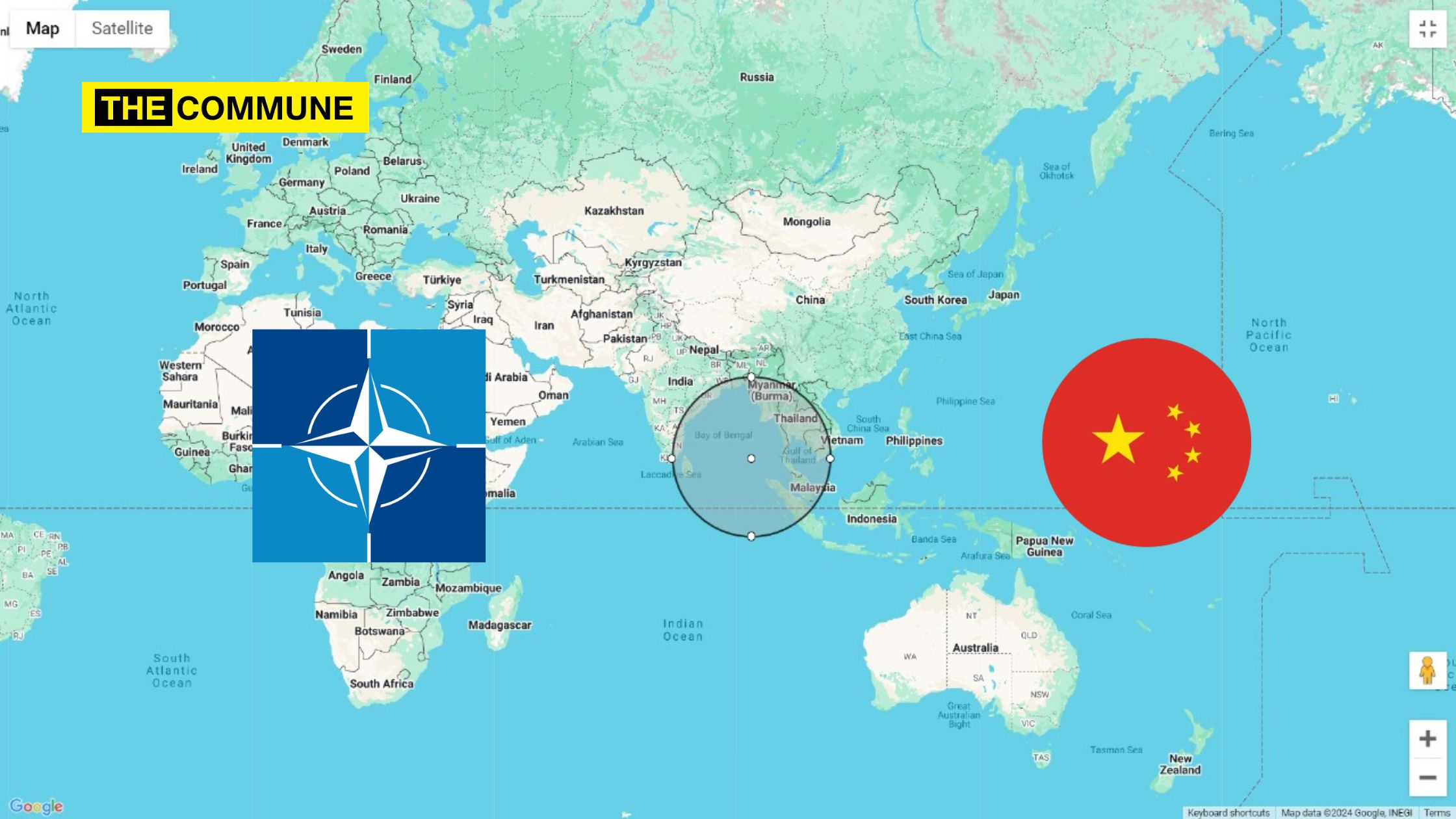
Car Nicobar, part of India’s Andaman and Nicobar Islands, occupies a critical geostrategic location in the Bay of Bengal. Situated at the heart of the Indo-Pacific, this island lies within a 1000-mile radius of several ASEAN countries, including Myanmar, Thailand, Indonesia, and Malaysia. It is near vital sea lines of communication (SLOCs), such as the Strait of Malacca.
As the region becomes the focal point of global geopolitical competition, particularly between China and NATO-aligned powers, India’s development of a port and airbase in Car Nicobar presents a unique opportunity to balance these external influences. This article delves into how this development would help India navigate the complexities of balancing NATO and Chinese influence while strengthening its strategic, economic, and military capabilities.
Geostrategic Significance In The Indo-Pacific
The Indo-Pacific region has emerged as a critical arena for global powers, with China expanding its presence through its Belt and Road Initiative (BRI) and growing naval activity, while NATO seeks to deepen partnerships with regional actors like Japan, South Korea, and Australia. Car Nicobar, located at the crossroads of important maritime routes, provides India with a crucial vantage point.
- Strategic Location: Car Nicobar’s proximity to the Strait of Malacca, one of the world’s most important chokepoints, positions India to monitor and protect critical shipping lanes that carry a significant portion of global trade.
- Extended Influence: Within a 1000-mile radius, India gains access to a wide swath of the Bay of Bengal and much of Southeast Asia, enhancing its ability to project power and safeguard its maritime interests in the region.
Balancing Chinese Influence
China’s increasing influence in the Indian Ocean and its “string of pearls” strategy—developing ports and military bases from the South China Sea to the Arabian Sea—has raised concerns for India’s strategic autonomy. China’s Hambantota Port in Sri Lanka, its Gwadar Port in Pakistan, and its naval base in Djibouti exemplify its growing footprint in the region.
- Countering China’s Maritime Expansion: A naval port and airbase in Car Nicobar would enable India to counter Chinese naval activities and ensure that its own maritime borders and the Bay of Bengal remain secure. India could more effectively monitor Chinese military and commercial movements, particularly as they approach Southeast Asia and the Indian Ocean.
- Surveillance and Intelligence: Car Nicobar’s airbase would serve as a critical point for maritime surveillance. Using drones, radar systems, and other intelligence assets, India could track Chinese naval deployments and ensure that its shipping routes remain free from external control.
- Deterring Chinese Influence in ASEAN: China’s aggressive posturing in the South China Sea and its growing economic influence in Southeast Asia has caused concern among ASEAN nations. By establishing a strong military and economic presence in Car Nicobar, India could reassure its Southeast Asian neighbors that it is a reliable partner capable of balancing Chinese dominance in the region.
Balancing NATO Influence
While NATO has traditionally been an Atlantic-focused alliance, its recent moves in the Indo-Pacific indicate a growing interest in the region. NATO’s increasing cooperation with Indo-Pacific partners like Japan, South Korea, and Australia, as well as its military exercises in the region, suggests a desire to assert influence far beyond its traditional theater of operations. For India, this presents both opportunities and challenges.
- Strategic Autonomy: While India shares concerns with NATO about Chinese expansion, it must maintain its own strategic autonomy. A robust military presence in Car Nicobar would allow India to pursue independent foreign policy goals, ensuring that it does not become overly dependent on NATO-aligned nations for security.
- Regional Power Balance: India’s development of a port and airbase in Car Nicobar would enable it to engage with NATO powers on its own terms, acting as a stabilizing force in the region without compromising its strategic neutrality. This would allow India to balance relations with both NATO and non-aligned ASEAN countries.
- Engagement without Alignment: Car Nicobar could serve as a base for joint military exercises and multilateral cooperation with NATO allies, such as the U.S., Japan, and Australia while ensuring that these engagements are conducted within a framework that respects India’s independent foreign policy.
Economic And Trade Advantages
Beyond military and strategic considerations, the development of a port and airbase in Car Nicobar would have significant economic benefits, particularly in terms of trade and connectivity with ASEAN nations. These Southeast Asian nations represent some of the world’s fastest-growing economies, and deeper trade ties with them would benefit India’s economy.
- Enhanced Trade Routes: The port in Car Nicobar could become a hub for maritime trade, offering shorter and more efficient shipping routes to Southeast Asian countries like Myanmar, Thailand, and Indonesia. This would boost economic integration between India and ASEAN, a key objective of India’s “Act East” policy.
- Boosting Economic Independence: While NATO countries and China are major trading partners for India, expanding trade with ASEAN provides an opportunity to diversify India’s economic partnerships, reducing reliance on any single bloc. This diversification would strengthen India’s economic resilience in an increasingly multipolar world.
Improved Maritime And Border Security
The Indian Ocean is rife with security challenges, including piracy, illegal fishing, and trafficking. Car Nicobar’s location allows India to enhance its maritime security and safeguard its borders in the eastern sector of the Indian Ocean.
- Maritime Domain Awareness: A naval port in Car Nicobar would significantly enhance India’s maritime domain awareness, allowing it to monitor shipping lanes, respond to illegal activities, and ensure the safe passage of vessels through the Bay of Bengal.
- Collaborative Maritime Security: India could engage in maritime security collaborations with ASEAN nations, positioning itself as a leader in regional security while simultaneously balancing the influence of external powers like NATO and China.
Military Preparedness And Strategic Deterrence
A fully operational airbase in Car Nicobar would significantly improve India’s military preparedness in the region, providing the capacity for rapid response and deterrence against potential threats. This would be crucial in balancing the growing influence of both China and NATO.
Air Power and Rapid Deployment: Car Nicobar’s airbase could host fighter jets, drones, and maritime patrol aircraft, enabling India to rapidly deploy forces in response to any maritime threat. The island’s strategic location ensures that India can project air power across much of Southeast Asia, deterring hostile actions by external powers.
Strategic Deterrence: The very presence of an Indian military installation in Car Nicobar would act as a strategic deterrent to both China and NATO, signaling that India is fully prepared to defend its interests and maritime borders.
Regional Cooperation And Humanitarian Assistance
Beyond military and economic considerations, Car Nicobar’s development also offers India opportunities to enhance regional cooperation, particularly with ASEAN and Indian Ocean nations.
- Joint Exercises with ASEAN: India could invite ASEAN nations to participate in joint naval and air exercises from Car Nicobar, building stronger security ties while balancing the influence of NATO and China.
- Humanitarian Aid and Disaster Relief (HADR): Car Nicobar is well-positioned to serve as a base for humanitarian missions, particularly given the frequency of natural disasters in the Bay of Bengal. This would enhance India’s soft power, demonstrating its leadership in regional disaster response while maintaining a balance between external powers.
Boost To Local Economy & Infrastructure
The development of a port and airbase would also have positive local impacts on the Nicobar Islands. It would spur economic growth and infrastructure development in the region.
- Job Creation: Construction and ongoing operation of the port and airbase would create employment opportunities for local residents, contributing to the socio-economic upliftment of the Nicobar Islands.
- Sustainable Development: Given the natural beauty and biodiversity of the Nicobar Islands, the development of infrastructure could be done in a way that promotes eco-tourism, further diversifying the local economy while ensuring environmental sustainability.The development of a port and airbase in Car Nicobar offers India multiple advantages, both in terms of countering Chinese influence and balancing NATO’s expanding role in the Indo-Pacific. Situated within a 1000-mile radius of critical ASEAN countries and key maritime routes, Car Nicobar offers India a unique opportunity to assert its influence in the region.
By strengthening its military presence, enhancing maritime security, and expanding economic ties with Southeast Asia, India can maintain its strategic autonomy while navigating the complex geopolitical landscape of the Indo-Pacific. This development will better position India to balance external influences and emerge as a leading power in the region.
Ganesh Kumar is a geo-political analyst.
Subscribe to our channels on Telegram, WhatsApp, and Instagram and get the best stories of the day delivered to you personally.




